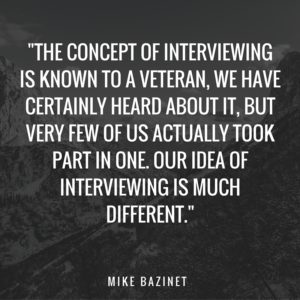Member Mike Bazinet, Associate Director of Plasma Recruitment at Grifols Inc. is authoring a series of guest posts on how employers can be more effective with their veteran recruitment, outreach and retention efforts. Be sure to read Mike’s previous post, “The Fear of the Unknown – What Corporate Recruiters Need to Know Before Interviewing Military Candidates.”
I went to bed the night of my retirement with every notion to sleep in; for the first time in a while I did not have to get up early and go to physical training, all I needed to do was sleep. Can anyone guess what time I woke up? Well, I woke up at 5:00 am, so I did what I always did. I got in the car and drove to PT! I got there and everyone came up, slapped me on the back, and welcomed me, I was happy to run with these men, the same ones I trained with for years. After our run, they all got in their cars and went to the shop. I stood there by my car and realized I was not going to be following them this morning, instead I was going home. It was a feeling I never forgot, for the first time in my life, I felt alone. I had no idea what I was going to do that day, of course my wife had other ideas. As I got into the house, I saw the honey do list I needed to accomplish. At least I had something to do. I tell you this story because this was when I realized that my life was completely different; everything I knew for twenty years was gone. I truly felt alone and to be honest I was actually scared.
For twenty years I was in control of my surroundings, I knew my job like the back of my hand. I was a good leader, a good soldier, I loved my profession and I truly enjoyed serving my country. The days following my retirement were completely different. The confident, self-assuredness that I had exhibited for twenty years, was now replaced with anxiety, nervousness and the fear of the unknown. My battle dress uniform (BDU), was replaced with slacks and a long sleeve dress shirt, my boots were now dress shoes, the salute was replaced with handshakes and my hair was slightly longer. I was living in the fear of the unknown; I was in a new world! I was stepping into Corporate America and one of the first things I had to overcome was something called an interview.

Let us discuss a small portion of my first interview, and what I thought about as I went through it. As I walked in the main building, I was greeted by the lead interviewer. He told me his name and shook my hand, sounds normal right? I immediately felt apprehensive; I thought to myself “what do I call him?” Yes, he told me his name, but I was used to calling people Sir or Ma’am, or by their title and last name. What you as a civilian take for granted is foreign to the military veteran. This simple statement caused anxiety. Within minutes of walking in the door, I was nervous and only focused on what to call the interviewers. I was already at a disadvantage. As the interview began, I found myself calling him “Sir,” and was corrected three times before I finally called him by his real name. Something as simple as a name was difficult for me to comprehend.
The veteran is viewing the interview completely opposite of what you are intending it to be. Interviewing is commonplace in Corporate America but not in the military. I recently hired a military recruiter, she had 24 years of experience, was First Sargent and a military recruiter for fourteen years. Her military experience was vast, her knowledge of recruitment far exceeded my civilian recruiters and her poise was exactly what I needed in this role. She confided in me that she was worried about the interview; she told me she received training but she had never done anything like this in the past. Her anxiety level was a nine on a scale of 1 to 10. She told me she felt like a child lost in a large mall or department store separated from their mother. She was anxious because she did not know if she would be able to answer the questions, how was she going to translate her job – she had no idea what to expect. She was in chaos and her stomach hurt, she was mired in the fear of the unknown.
As the veteran is sitting across from you, you must remember they are viewing this interview with uncertainty and apprehension. If this is their first interview, they are more than likely terrified. Try to remember how you felt on your first interview. You may have been nervous, but interviewing is a common part of a civilian’s life. Now put yourself in the veteran’s shoes. They have never interviewed, and this concept of interviewing has never been part of their everyday life. For many of them, their interview acumen is that of a college graduate. How the veteran views the interview is different from you as the civilian recruiter. We must remember to put ourselves in the shoes of the veterans as best we can to give them an opportunity to shine. Until we realize that the military veteran is looking at this interview from a completely different angle, we will struggle hiring veterans into our workforce. Make it a good day and hire a vet!
Mike Bazinet is the Associate Director of Plasma Recruitment with Grifols Inc., a global healthcare company that creates 53 annual affirmative action plans. During a 20-year career in the United States Air Force, he recruited pilots, navigators, engineers, medical doctors, nurses and pharmacists. As a civilian, he worked for Orion International, a recruitment organization specializing in assisting retiring and separating veterans to gain access to positions within Corporate America. He was also instrumental in creating and launching the Orion International Health Professions division. In 2008, Mike took a recruiting position at Grifols and was quickly promoted to Supervisor of Recruitment in 2009, then Manager of Recruitment in 2011. In 2014, his team achieved a milestone year, hiring over 3,400 new employees. His team surpassed that milestone in 2015 and hired a total of 3,700 employees into the Grifols family. In his current role as Associate Director of Staffing, Mike has control of the strategic development and process of the recruitment efforts within Grifols Plasma Organization. Since being at Grifols Mike has been directly involved with the affirmative action program at Grifols and has played an integral part in the training and execution of the overall program at Grifols.

